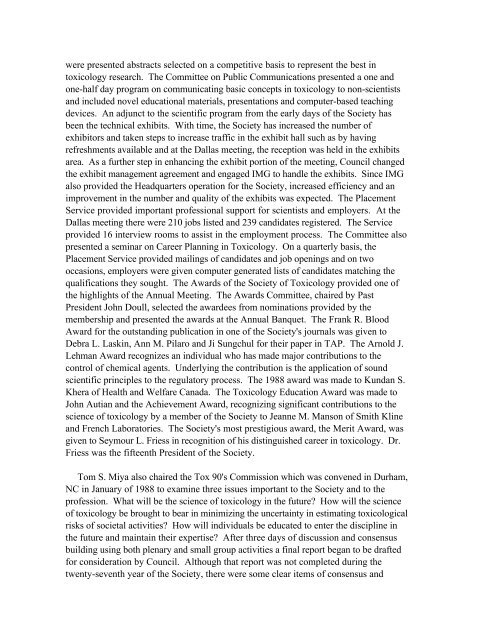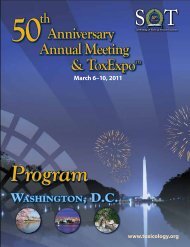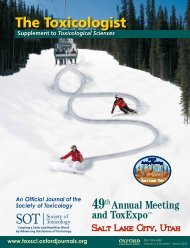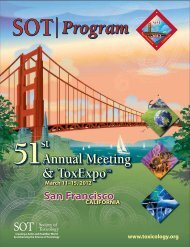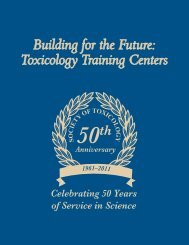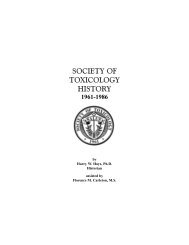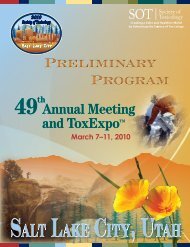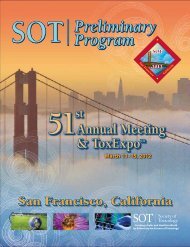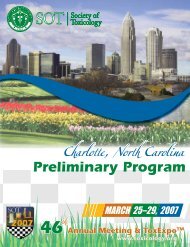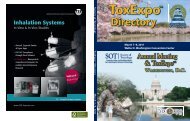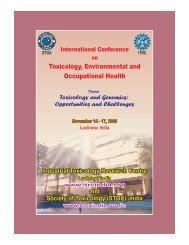SOCIETY O. TOXICOLOGY HISTORY - Society of Toxicology
SOCIETY O. TOXICOLOGY HISTORY - Society of Toxicology
SOCIETY O. TOXICOLOGY HISTORY - Society of Toxicology
You also want an ePaper? Increase the reach of your titles
YUMPU automatically turns print PDFs into web optimized ePapers that Google loves.
were presented abstracts selected on a competitive basis to represent the best in<br />
toxicology research. The Committee on Public Communications presented a one and<br />
one-half day program on communicating basic concepts in toxicology to non-scientists<br />
and included novel educational materials, presentations and computer-based teaching<br />
devices. An adjunct to the scientific program from the early days <strong>of</strong> the <strong>Society</strong> has<br />
been the technical exhibits. With time, the <strong>Society</strong> has increased the number <strong>of</strong><br />
exhibitors and taken steps to increase traffic in the exhibit hall such as by having<br />
refreshments available and at the Dallas meeting, the reception was held in the exhibits<br />
area. As a further step in enhancing the exhibit portion <strong>of</strong> the meeting, Council changed<br />
the exhibit management agreement and engaged IMG to handle the exhibits. Since IMG<br />
also provided the Headquarters operation for the <strong>Society</strong>, increased efficiency and an<br />
improvement in the number and quality <strong>of</strong> the exhibits was expected. The Placement<br />
Service provided important pr<strong>of</strong>essional support for scientists and employers. At the<br />
Dallas meeting there were 210 jobs listed and 239 candidates registered. The Service<br />
provided 16 interview rooms to assist in the employment process. The Committee also<br />
presented a seminar on Career Planning in <strong>Toxicology</strong>. On a quarterly basis, the<br />
Placement Service provided mailings <strong>of</strong> candidates and job openings and on two<br />
occasions, employers were given computer generated lists <strong>of</strong> candidates matching the<br />
qualifications they sought. The Awards <strong>of</strong> the <strong>Society</strong> <strong>of</strong> <strong>Toxicology</strong> provided one <strong>of</strong><br />
the highlights <strong>of</strong> the Annual Meeting. The Awards Committee, chaired by Past<br />
President John Doull, selected the awardees from nominations provided by the<br />
membership and presented the awards at the Annual Banquet. The Frank R. Blood<br />
Award for the outstanding publication in one <strong>of</strong> the <strong>Society</strong>'s journals was given to<br />
Debra L. Laskin, Ann M. Pilaro and Ji Sungchul for their paper in TAP. The Arnold J.<br />
Lehman Award recognizes an individual who has made major contributions to the<br />
control <strong>of</strong> chemical agents. Underlying the contribution is the application <strong>of</strong> sound<br />
scientific principles to the regulatory process. The 1988 award was made to Kundan S.<br />
Khera <strong>of</strong> Health and Welfare Canada. The <strong>Toxicology</strong> Education Award was made to<br />
John Autian and the Achievement Award, recognizing significant contributions to the<br />
science <strong>of</strong> toxicology by a member <strong>of</strong> the <strong>Society</strong> to Jeanne M. Manson <strong>of</strong> Smith Kline<br />
and French Laboratories. The <strong>Society</strong>'s most prestigious award, the Merit Award, was<br />
given to Seymour L. Friess in recognition <strong>of</strong> his distinguished career in toxicology. Dr.<br />
Friess was the fifteenth President <strong>of</strong> the <strong>Society</strong>.<br />
Tom S. Miya also chaired the Tox 90's Commission which was convened in Durham,<br />
NC in January <strong>of</strong> 1988 to examine three issues important to the <strong>Society</strong> and to the<br />
pr<strong>of</strong>ession. What will be the science <strong>of</strong> toxicology in the future? How will the science<br />
<strong>of</strong> toxicology be brought to bear in minimizing the uncertainty in estimating toxicological<br />
risks <strong>of</strong> societal activities? How will individuals be educated to enter the discipline in<br />
the future and maintain their expertise? After three days <strong>of</strong> discussion and consensus<br />
building using both plenary and small group activities a final report began to be drafted<br />
for consideration by Council. Although that report was not completed during the<br />
twenty-seventh year <strong>of</strong> the <strong>Society</strong>, there were some clear items <strong>of</strong> consensus and


